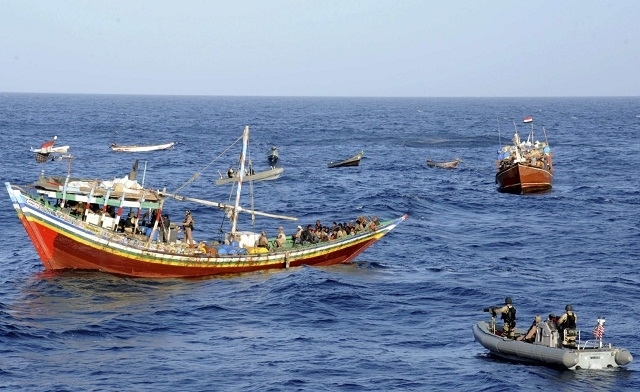
The thriving black-market industry of piracy cost the world economy an estimated $7 billion in 2011, and pirates themselves netted about $160 million in ransoms alone, according to a recent report from the International Maritime Bureau.
Although international cooperation and the education of shipping companies is finally resulting in a reduction of overall pirate attacks, the threat still looms over international trade. The future of piracy remains uncertain, largely due to the nature of pirate organizations. They remain shadowy and are far from understood: how many are there? how do they recruit? what are their operational capacities? Those are just some of the few questions that many are trying to answer.
In a disturbing trend, it looks like many of them are becoming more professional. Reuters recently obtained a copy of a packet of paperwork produced by a group of pirates, that is reportedly distributed to their hostages upon successful completion of a hijacking.
The letter, addressed “to whom it may concern”, in reads in less-than-perfect English, “Having seen when my Pirate Action Group (P.A.G) had controlled over your valuable vessel we are saying to you Company/Owner welcome to Jamal’s Pirate Action Group (J.P.A.G) and you have to follow by our law to return back your vessel and crew safely.”
Jamal signs off with “do not imagine that we are making to you intimidation,” offering “best regards” from the “General Commander of the Group”. In this case, Jamal even has a stamped pirate seal, depicting a perhaps cliché symbol of skill and crossed swords, accompanied with J.P.A.G.
In this particular letter, Jamal provided the company with a detailed evaluation of the tanker’s wort, including accounting for the oil it contained and the value of the human crew. He then provided an apparently (in his opinion anyway), well-founded ransom demand.
Such professionalism reminds companies that Jamal too is really just seeking profits. Plus, the more organized and official they appear, the less likely they feel they are to be attacked or raided: Nobody wants to mess with a well-organized, professional group of pirates.
Of course, Jamal’s professionalism fools few: pirates are known to be ruthless, violent and uncompromising in their ransom negotiations.
Shipping companies often balk at paying the hefty ransoms that pirates like Jamal routinely request. Of course, insurance companies often offer these companies kidnap and ransom insurance if their vessels travel dangerous waters. However, the premiums can be high, especially during periods of high pirate activity.
Unfortunately, many companies skip the insurance and simply hope for the best, but that doesn’t always work out. And when things go south for an uninsured company, it’s usually the crew that suffers. If a company is too cheap to pay for pirate insurance, they will certainly be too cheap to pay a multi-million dollar ransom.
As pirate attacks decrease, these insurance rates are dropping. Especially if shippers employ armed guards, they can often receive $5 million in potential ransom coverage for as little as $3,000.
As the threat of piracy remains a thorn in the side of the global economy, an interesting sub-market for ransom negotiation and insurance has emerged. And believe it or not, the pirates are attempting to make themselves reputable players in this game.